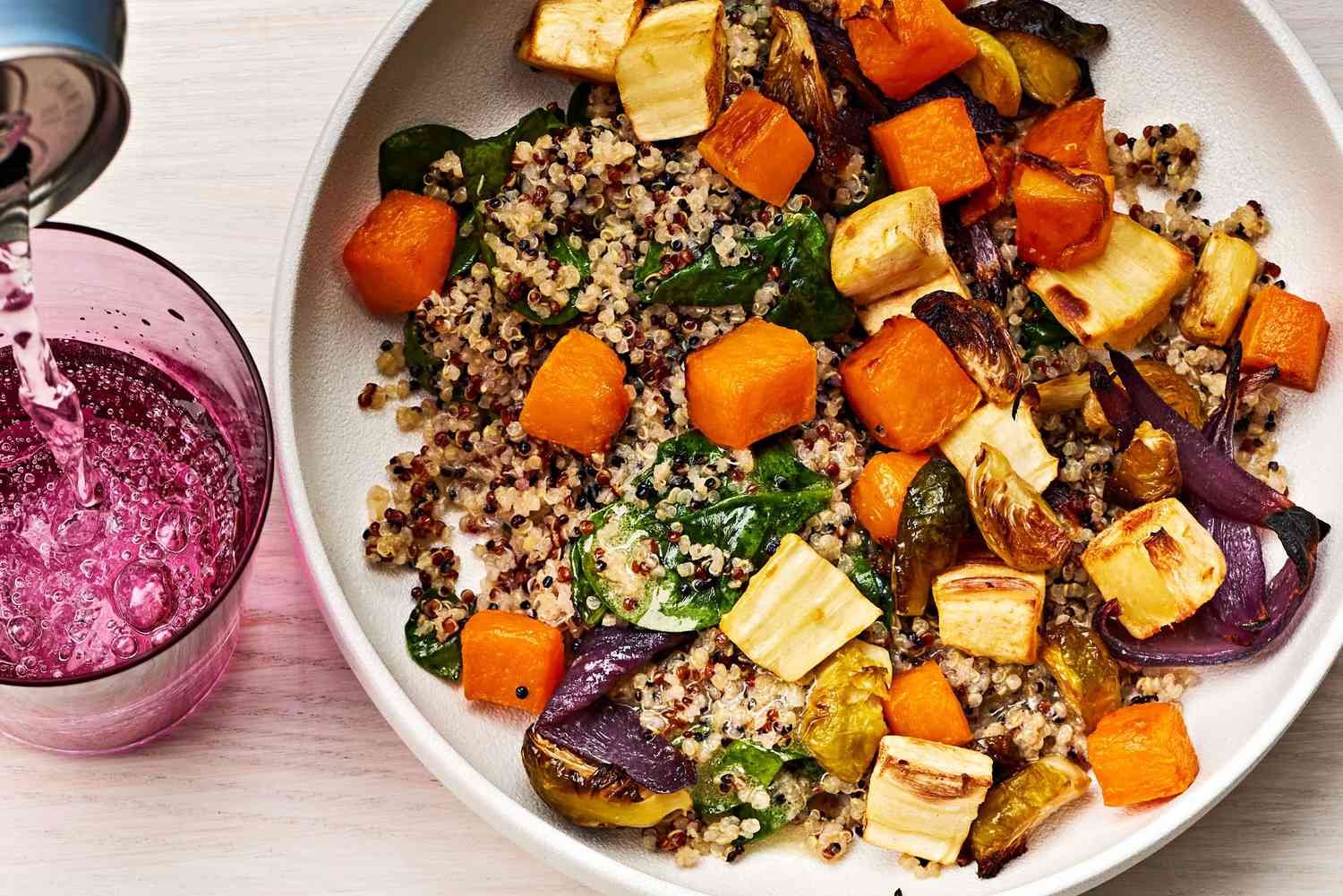Imagine sitting down to a dinner that not only satisfies your taste buds but also supports your heart health. You’re not alone if you’ve ever felt overwhelmed by the idea of cooking meals that are both delicious and good for your heart.
Here’s the good news: heart-healthy meals for dinner can be simple, flavorful, and satisfying. You deserve to enjoy meals that do more than fill you up—they should fuel your body and protect your heart. You’ll discover easy-to-make recipes and tips that will transform your dinner into a heart-friendly feast.
Dive in to learn how you can make small changes that have a big impact on your health, without sacrificing taste or your time.
:strip_icc()/macaroni-cheese-with-cashew-cream-RU341666-229ecc31aae34a578b6502ad70744c7f.jpg)
Credit: www.bhg.com
Benefits Of Heart-healthy Meals
Heart-healthy meals for dinner boost cardiovascular health by reducing cholesterol and blood pressure. They provide essential nutrients like fiber, vitamins, and healthy fats. Enjoying these meals can lead to better energy levels and overall well-being.
Heart-healthy meals can transform your dinner routine and improve your overall well-being. Eating meals that support heart health is not just about avoiding illness but embracing vitality. Imagine feeling more energetic and less weighed down after dinner. Heart-healthy meals can offer you that refreshing change. Dive into the benefits and see how they can positively impact your life.Enhance Cardiovascular Health
Heart-healthy meals are rich in nutrients that support the cardiovascular system. Foods like salmon, nuts, and leafy greens can lower bad cholesterol levels. They also improve blood circulation. Have you noticed how a lighter meal leaves you feeling less sluggish? That’s your body thanking you for the healthier choice.Boost Your Energy Levels
A heart-healthy dinner doesn’t just keep your heart happy; it energizes you. Whole grains and lean proteins provide sustained energy. A quinoa salad with grilled chicken can power you through an evening workout. How often do you feel tired after a heavy meal? Choosing heart-friendly options can make a difference.Support Weight Management
Maintaining a healthy weight becomes easier with heart-healthy meals. They are typically lower in unhealthy fats and sugars. Think of a colorful stir-fry packed with veggies and tofu. It’s satisfying without the extra calories. Have you struggled with weight management? These meals can be a practical solution.Promote Mental Well-being
There’s a connection between what you eat and how you feel. Foods that are good for the heart are also good for the brain. Omega-3 fatty acids found in fish can improve mood and cognitive function. Have you ever felt mentally drained after a fast-food dinner? Switching to heart-healthy choices can help lift your spirits.Encourage Family Bonding
Heart-healthy meals can bring families together. Cooking a nutritious dinner can be a fun activity for everyone. Try making a homemade pizza with whole wheat crust and fresh toppings. It’s an opportunity to share, connect, and teach kids about healthy eating. What better way to bond than over a meal that nourishes both body and soul? Embracing heart-healthy meals doesn’t require a drastic lifestyle overhaul. It’s about making mindful choices at dinner. As you explore these benefits, think about how they can fit into your routine. What small change can you make today to support your heart?Key Ingredients For Heart Health
Having a healthy heart is essential for living a vibrant life. What you eat plays a big role in keeping your heart in top shape. Dinner is a great time to focus on meals that support heart health. You might be surprised by how delicious and satisfying heart-healthy meals can be. Let’s dive into the key ingredients that should be on your dinner plate for a healthier heart.
Omega-3 Rich Foods
Omega-3s are crucial for heart health. They help reduce inflammation and lower the risk of heart disease. Think about adding fish like salmon or mackerel to your dinner menu. If fish isn’t your thing, try flaxseeds or chia seeds. They are easy to add to salads or smoothies.
Whole Grains
Whole grains are packed with fiber, which helps lower cholesterol. Swap out white rice or pasta for brown rice or quinoa. Whole grain bread is a tasty alternative to white bread. Your heart will thank you for these simple changes.
Fruits And Vegetables
Fruits and vegetables are loaded with vitamins and minerals. They are essential for heart health. Add a colorful salad to your dinner or roast some veggies. You’ll be amazed at how a sprinkle of lemon juice can enhance the flavor.
Nuts And Seeds
Grab a handful of almonds or walnuts for a heart-healthy snack. They are full of healthy fats. Sprinkle sunflower or pumpkin seeds over your dishes for an extra crunch. These small additions can make a big difference.
Lean Proteins
Lean proteins like chicken or turkey can be a great base for a heart-healthy meal. Trim off any excess fat before cooking. If you’re vegetarian, try lentils or beans as protein sources. They are versatile and can be used in soups or stews.
Each of these ingredients offers unique benefits for your heart. Have you tried mixing them up for a dynamic dinner? Imagine a grilled salmon fillet paired with a quinoa salad. How about a veggie stir-fry with tofu and a sprinkle of nuts? With so many options, what heart-healthy meal will you try tonight?
Cooking Methods To Retain Nutrients
Cooking methods play a crucial role in heart health. They influence the nutrient retention in meals. Choosing the right technique can enhance the nutritional value of food. It can also reduce unhealthy fats and calories. This section explores various cooking methods. These methods aim to retain nutrients and promote heart health.
Steaming And Grilling
Steaming preserves essential vitamins and minerals. It uses minimal water and prevents nutrient loss. Vegetables retain their color and crunch. This method avoids added fats and oils. Grilling offers a flavorful alternative. It allows fats to drip away from food. This reduces overall fat content. Grilled meats and vegetables have a smoky taste. They are both delicious and heart-friendly.
Baking Instead Of Frying
Baking is a healthy alternative to frying. It uses dry heat and does not require excess oil. This method lowers calorie content significantly. Baked dishes retain their natural flavors. They are less greasy and easier to digest. Baking helps in preserving nutrients better. It is ideal for meats, vegetables, and grains.
Using Healthy Oils
Healthy oils make a difference in heart health. Olive oil and avocado oil are great choices. They contain monounsaturated fats which are good for the heart. These oils enhance the taste of meals. They do not compromise on nutritional value. Using healthy oils in cooking helps maintain a balanced diet. It supports overall heart wellness effectively.
Delicious Dinner Recipes
Eating heart-healthy meals doesn’t mean giving up flavor. Delicious dinner recipes can be both nutritious and satisfying. With a mix of lean proteins, fresh vegetables, and whole grains, these meals nourish the body. They also delight the taste buds, offering a satisfying end to your day. Explore these delightful recipes, each packed with nutrients and flavor.
Grilled Salmon With Quinoa Salad
Salmon is rich in omega-3 fatty acids, great for the heart. Grilling it enhances its natural flavors. Pair it with a quinoa salad. Quinoa is a complete protein, offering all essential amino acids. Toss it with fresh vegetables like cucumber and cherry tomatoes. A light lemon dressing adds zest.
Vegetable Stir-fry With Brown Rice
Stir-fry is quick and full of colorful vegetables. Choose broccoli, bell peppers, and carrots for a nutrient boost. Sauté them in a bit of olive oil. Serve over brown rice, which is high in fiber. This combination keeps you full and satisfied.
Lentil Soup With Spinach
Lentils are a great source of plant-based protein. They also contain fiber and iron. Cook them into a hearty soup with spinach. Spinach adds vitamins and minerals. This soup is both warming and nourishing, perfect for dinner.
Chicken Breast With Roasted Vegetables
Chicken breast is lean and protein-rich. Season it with herbs and bake until tender. Serve with roasted vegetables like zucchini, sweet potatoes, and carrots. Roasting brings out their natural sweetness. This dish is simple yet flavorful.
Meal Planning Tips
Planning heart-healthy meals for dinner doesn’t have to be complex. With simple strategies, you can make meals that support heart health. Meal planning helps control ingredients and maintain balance. Here, we provide essential tips to guide your meal planning process.
Balancing Your Plate
A balanced plate includes a mix of nutrients. Aim for half your plate to be fruits and vegetables. Choose whole grains like brown rice or quinoa for a quarter of your plate. The remaining quarter should be lean proteins. Think chicken, fish, or plant-based options. This balance supports heart health and keeps meals satisfying.
Portion Control
Portion control plays a crucial role in maintaining a healthy heart. Use smaller plates to help manage portions. Fill half your plate with vegetables to avoid overeating. Pay attention to serving sizes on labels. This can prevent consuming extra calories. Mindful eating also helps in recognizing true hunger signals.
Incorporating Variety
Variety in meals ensures a range of nutrients. Rotate different fruits and vegetables throughout the week. Try new grains or proteins to keep meals interesting. Different colors on your plate often mean diverse nutrients. A varied diet helps in meeting nutritional needs and keeps meals exciting.
Shopping For Heart-healthy Ingredients
Selecting heart-healthy ingredients makes dinner nutritious and delicious. Include fresh vegetables, lean proteins, and whole grains. Eating these foods supports heart health and promotes overall wellness.
Shopping for heart-healthy ingredients is an important step in preparing nutritious meals. Choosing the right foods can significantly impact heart health. Making informed decisions in the grocery aisle is crucial. Focus on items that support a balanced diet and promote heart health. It’s not just about what you buy; it’s about understanding the ingredients that make a difference. Let’s dive into key areas to consider while shopping.Reading Labels
Understanding food labels is essential for choosing heart-healthy products. Look for items with low saturated fat. Check for sodium content as well. Ingredients should be simple and recognizable. Avoid trans fats. Choose foods with high fiber content. Whole grains and healthy fats are beneficial. Labels often highlight these key nutrients.Choosing Fresh Produce
Fresh produce is a cornerstone of heart-healthy eating. Opt for colorful fruits and vegetables. They provide essential vitamins and antioxidants. Leafy greens like spinach and kale are great choices. Berries offer heart-protective benefits. Seasonal produce is often fresher and more affordable. Buying organic can reduce pesticide exposure.Selecting Lean Meats
Lean meats are important for a heart-healthy diet. Choose poultry without the skin. Fish, especially fatty varieties, are rich in omega-3s. These are beneficial for heart health. Limit red meat consumption. If buying beef, look for lean cuts. Avoid processed meats high in sodium. Baking or grilling is healthier than frying.Common Misconceptions
Many believe heart-healthy dinners lack flavor and variety. In truth, they can be both tasty and diverse. Simple ingredients like lean proteins, whole grains, and colorful veggies create delicious meals.
### Common Misconceptions When thinking about heart-healthy dinners, many people are quick to make assumptions that can lead to poor dietary choices. It’s easy to fall into the trap of believing everything you hear. But what if some of what you believe about heart-healthy eating is actually misleading? Let’s break down some common misconceptions that might be holding you back from truly nourishing your heart.Low-fat Vs. Healthy Fat
A common misconception is that all fats are bad for your heart. But, did you know that your body needs certain fats to function properly? Not all fats are created equal. Healthy fats, like those found in avocados, nuts, and olive oil, can actually support heart health. They can help reduce bad cholesterol levels and are an excellent source of energy. Next time you plan a dinner, consider swapping out that low-fat dressing for a drizzle of extra virgin olive oil. On the other hand, many low-fat products are often loaded with sugar and additives to make them taste better. These can be more harmful than the fats they replace. So, when choosing between low-fat and healthy fat options, remember that quality matters more than quantity.Processed Foods Myths
Processed foods often get a bad reputation when it comes to heart health. You might think avoiding them altogether is the safest bet. But not all processed foods are unhealthy. For example, canned beans and frozen vegetables can be nutritious and convenient options for a quick dinner. They retain most of their nutrients and are a great way to include more fiber and protein in your meals. Just be mindful of added salt or sugar. I once avoided anything that came in a can or package, thinking it was the best choice for my heart. But this approach limited my dinner options and made meal prep more challenging. Learning to read labels and understanding what to look for allowed me to include processed foods wisely. Are you letting misconceptions limit your heart-healthy dinner options? By understanding the difference between myths and facts, you can make informed choices that truly benefit your heart.
Credit: www.womansday.com
Incorporating Heart-healthy Habits
Incorporating heart-healthy habits into your daily routine can transform your dinner table and life. It isn’t just about choosing the right foods; it’s about making choices that promote overall well-being. Engaging in regular exercise and mindful eating practices can significantly impact your heart health, making every meal a step towards a healthier lifestyle.
Regular Exercise
Exercise is a cornerstone of heart health. It boosts your mood and strengthens your cardiovascular system. You don’t need to run marathons to see benefits; even a brisk walk after dinner can make a difference. Have you ever noticed how a short walk can help digestion and clear your mind? Try integrating a quick walk or light stretching into your evening routine. You’ll be surprised at how it can elevate your energy and improve your heart health.
Mindful Eating Practices
Eating mindfully means paying attention to your meals without distractions. Think about the colors and textures on your plate. How does each bite feel? This practice helps you appreciate the food and recognize when you’re full. Are you aware of how often you eat without thinking? Slowing down can prevent overeating and improve digestion. Consider creating a calm dining environment by turning off screens and savoring each bite. Your heart will thank you, and so will your waistline.
Ultimately, heart-healthy habits are about small, consistent changes. These changes can lead to significant improvements in your well-being. What small step will you take today to prioritize your heart health at dinner?
:max_bytes(150000):strip_icc()/7218337-6fb3ff0f8df9438db560ffa736e40b25.jpg)
Credit: www.eatingwell.com
Frequently Asked Questions
What Is The Best Dinner For A Heart Patient?
A heart-healthy dinner includes grilled fish, steamed vegetables, whole grains, and a fresh salad. Use olive oil for cooking. Limit salt and choose herbs for flavor. Opt for lean proteins and include legumes. Drink water or herbal tea instead of sugary drinks.
What Is The One Snack Cardiologists Want You To Eat For A Healthier Heart?
Cardiologists recommend nuts, especially almonds or walnuts, for a healthier heart. They are rich in heart-friendly nutrients. Consuming a small handful daily can improve cholesterol levels and reduce inflammation. Choose unsalted varieties to maximize health benefits.
What Is A Good Heart-healthy Meal Plan?
A heart-healthy meal plan includes fruits, vegetables, whole grains, lean proteins, and healthy fats. Limit sodium, sugar, and processed foods. Drink plenty of water and choose smaller portions to maintain a balanced diet. Regular meals and snacks help keep your energy levels stable throughout the day.
Is Pasta A Heart-healthy Food?
Pasta can be heart-healthy when eaten in moderation. Choose whole-grain pasta for more fiber and nutrients. Pair it with heart-friendly toppings like vegetables, lean proteins, and olive oil. Avoid heavy, creamy sauces to maintain its health benefits. Balance pasta with other nutrient-rich foods for a heart-healthy diet.
Conclusion
Eating heart healthy meals at dinner supports a strong heart. These meals can be tasty and nutritious. Fresh vegetables, lean proteins, and whole grains are key ingredients. They help lower cholesterol and blood pressure. Small changes in dinner choices make a big difference.
Enjoy a variety of colorful vegetables. Choose grilled or baked options for proteins. Whole grains provide necessary fiber and nutrients. Keep salt and sugar to a minimum. Eating well keeps your heart happy. Make heart health a daily goal. Small steps lead to better health.
Your heart will thank you for these delicious choices.






